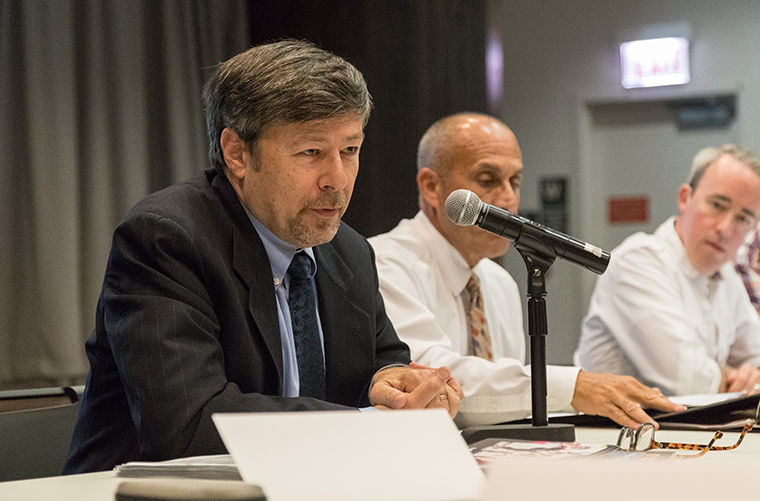Faculty Senate concerned about suspended programs, marketing campaign
September 21, 2018
Faculty senators questioned the provost’s decision to suspend programs following disappearances from the college’s website and the Common Application used by high school students to apply to colleges.
Jaafar Aksikas, a member of the senate’s Academic Affairs Committee and associate professor in the History, Humanities and Social Sciences Department, said at the Sept. 14 faculty senate meeting he was confused by the provost’s decision in May to suspend the creative arts therapies and cultural studies programs, effective this academic year.
The provost previously told the senate officers the situation was a miscommunication but many senators shared Aksikas’ sentiment.
“It is of dire urgency that we, as senators, press that this process [of suspending programs] be clearly articulated,” said Katie Paciga, secretary for Faculty Senate and associate professor in the History, Humanities and Social Sciences Department.
Aksikas proposed charging the discontinuance committee with finding out why the provost chose to suspend the programs.
“It’s important we remind ourselves when management infantilizes the folks they are managing, we wind up encouraging infantile behavioral response in the long run,” said Dave Gerding, associate professor in the Interactive Arts and Media Department. “The administration [should] think long and hard about making those decisions behind closed doors.”
Senators said the problem with the programs not being on the Common Application is that departments would not be able to use application data to gauge prospective student interest and revise the programs to make them more marketable and profitable.
The senate also discussed the provost’s right to permanently discontinue the currently-suspended programs, Paciga said.
Mark Rosati, vice president of Strategic Marketing and External Relations, and Michael Joseph, vice president of Enrollment Management, presented their goals for the upcoming academic year during the meeting.
“[Rosati’s] job is to highlight our students and take advantage of the wonderful things you do in order to tell the world how wonderful we are,” Joseph said. “My job is to use you. [We haven’t] done a good job of that in the past. I need to make sure we’re telling the Columbia story.”
Joseph said he plans to share enrollment promotion among all departments, faculty, current students and alumni. By marketing Columbia as a vibrant place with a fierce spirit, Joseph said the administration can tackle many of the challenges in entrepreneurship the college has faced.
Rosati said increasing positive, outside media coverage of Columbia and its students will increase the amount of prospective students, and that the college had already received 5,000 more enrollment inquires than this time last year.
While looking for an advertising agency to create the college’s new marketing campaign, Joseph said he was looking for Chicago-based companies who had experience both with higher education clients and the college’s target demographic.
Rosati said a consulting firm previously pointed to several low-traffic programs at the college.
“They looked at a number of different issues and determined there were some programs we should put energy into to increase their potential for growth,” Joseph said. “My approach is going to be to market and promote all of our programs. There’s a reason they all exist. Some may not need as much attention than others, some may need more.”
The senate Financial Affairs Committee also said it would tackle copyright and intellectual property issues for faculty and students so work produced at the college would have clear and succinct ownership guidelines.
Gerding said in the past senators have drafted policies on ownership of work on campus, but upon submitting those policies for review, they received pushback from administrators.
“We came up with a policy that would’ve covered faculty, too [and] thought the administration might be interested. It all evaporated,” Gerding said. “Historically, there’s been resistance where there’s never an impulse to try to clarify IP because it’ll mean having an honest conversation with faculty.”








